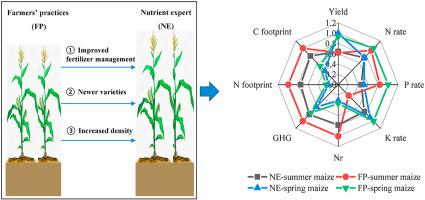Journal of Environmental Management ( IF 8.0 ) Pub Date : 2021-01-11 , DOI: 10.1016/j.jenvman.2021.111956 Shaohui Huang , Wencheng Ding , Liangliang Jia , Yunpeng Hou , Jiajia Zhang , Xinpeng Xu , Rui Xu , Sami Ullah , Yingxia Liu , Ping He

|
Excessive fertilizer consumption, poor management, and intense pollution currently restrict sustainable agriculture in China. To address these problems, two 9-year experiments involving typical maize production systems in Northcentral China (summer maize) and Northeast China (spring maize) were conducted to evaluate the effectiveness of Nutrient Expert (NE) management, a Nutrient Decision Support System which combines 4 R nutrient management with improved varieties and optimized plant density, on reducing carbon (C) and nitrogen (N) footprints. The mean grain yields under NE were 7.4 and 11.5 tons ha−1, which were 3.9% and 6.9% higher than those of local farmers’ practices (FP) in the summer and spring maize systems, respectively; the N-derived (affected by N fertilization) yield accounted for 21.7% and 73.5% of the total yield under NE, respectively. Compared with FP, NE achieved 21.8% and 16.0% lower reactive nitrogen (Nr) losses, 18.4% and 20.9% lower greenhouse gas (GHG) emissions, 24.8% and 21.4% smaller N footprints (9.1 and 2.3 kg N ton−1 grain), and 21.5% and 26.0% smaller C footprints (436 and 206 kg CO2 eq ton−1 grain) in summer and spring maize, respectively. NE reduced the N-derived N and C footprints by 30.3% and 27.2% in summer maize and 22.9% and 28.0% in spring maize, respectively, as a result of greater yields and optimal N management. Moreover, compared with summer maize, spring maize showed significantly smaller N-derived N (12.6-fold) and C (7.2-fold) footprints. The results demonstrated the ability of long-term NE management to sustain maize yields, reduce Nr losses and GHG emissions, and cut C and N footprints, indicating its potential suitability as an alternative management for sustainable agriculture. Moreover, the summer maize system still had considerable potential for environmental footprints reduction even when current NE management practices were adopted.









































 京公网安备 11010802027423号
京公网安备 11010802027423号